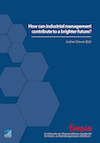Search


Bibtex
Cite as text
@Inbook{Wilkens+Field,
Cite-key = "Wilkens2023WGAB",
Year= "2023",
Volume= "Schriftenreihe der Wissenschaftlichen Gesellschaft für Arbeits- und Betriebsorganisation (WGAB) e. V.",
Pages= "77-94",
Journal = "WGAB",
Title= "Creative Intent and Reflective Practices for Reliable and Performative Human-AI Systems",
Author= "Uta Wilkens (1), Ambrose Field (2);
(1) Institut für Arbeitswissenschaft, Ruhr-Universität Bochum, DE,
(2) University of York, UK",
Doi= "https://doi.org/10.30844/wgab_2023_5",
Abstract= "In our contribution we underline the relevance of creative intent for making semi-autonomous human-AI systems reliable and performative. We show the challenges resulting from the autonomy of AI-based systems and argue that human creative intent allows to cope with them and to bring systems forward. It provides them with the capacity to generate meaningful contextual interactions through hybrid human-technology reflective practices. We illustrate the necessity for enhancing the reliability of systems on the basis of a high variety of use cases from (semi)autonomous driving, manufacturing, software development, healthcare and higher education - all of outstanding relevance for societal development towards a bright future. Against this background we discuss how to design technology for keeping human creative intent and performative reflective practices in the loop. The outlook gives emphasis to future research methods with respect to living lab components and ethnographic research in order to reach the necessary contextualization.",
Keywords= "creative intent, reflective practice, artificial intelligence, reliability, semi-autonomous system",
}
Uta Wilkens (1), Ambrose Field (2);
(1) Institut für Arbeitswissenschaft, Ruhr-Universität Bochum, DE,
(2) University of York, UK(2023): Creative Intent and Reflective Practices for Reliable and Performative Human-AI Systems. Schriftenreihe der Wissenschaftlichen Gesellschaft für Arbeits- und Betriebsorganisation (WGAB) e. V.(2023), S. 77-94. Online: https://doi.org/10.30844/wgab_2023_5 (Abgerufen 23.02.26)
Open Access
Abstract
Abstract
In our contribution we underline the relevance of creative intent for making semi-autonomous human-AI systems reliable and performative. We show the challenges resulting from the autonomy of AI-based systems and argue that human creative intent allows to cope with them and to bring systems forward. It provides them with the capacity to generate meaningful contextual interactions through hybrid human-technology reflective practices. We illustrate the necessity for enhancing the reliability of systems on the basis of a high variety of use cases from (semi)autonomous driving, manufacturing, software development, healthcare and higher education - all of outstanding relevance for societal development towards a bright future. Against this background we discuss how to design technology for keeping human creative intent and performative reflective practices in the loop. The outlook gives emphasis to future research methods with respect to living lab components and ethnographic research in order to reach the necessary contextualization.
Keywords
Schlüsselwörter
creative intent, reflective practice, artificial intelligence, reliability, semi-autonomous system

 English
English